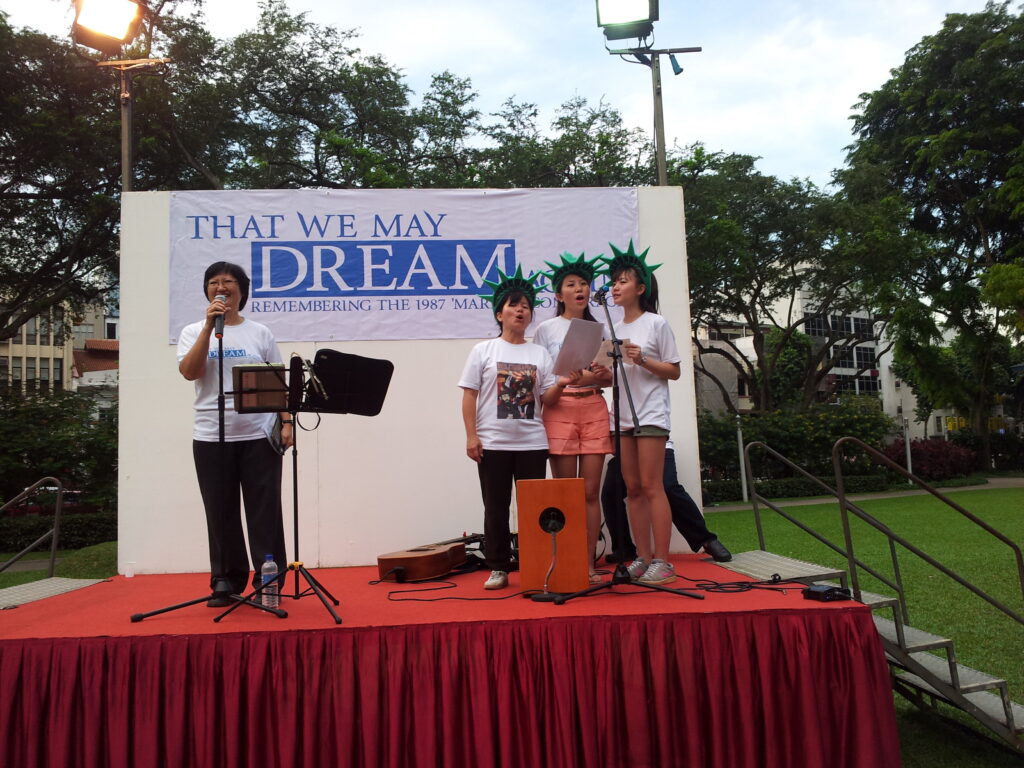
Event at Hong Lim Park on June 2, 2012 commemorating the 25th Anniversary of Operation Spectrum on May 21, 1987.
History of the ISA
The Internal Security Act (ISA) is a controversial law that was enacted during peacetime in Malaya and Singapore by the colonial authorities. Following Japan’s invasion of Malaya in December 1941 and the fall of Singapore on February 15, 1942, the British swiftly withdrew from Malaya, leaving the Communist Party of Malaya (CPM) to resist the occupation. The CPM’s significant contribution during the war years was widely recognized by both the populace and the British authorities after the conflict.
Upon the British’s return to Malaya in 1945, they bestowed upon Chin Peng, the leader of the CPM, two medals and the prestigious Order of the British Empire (OBE) for his exceptional achievements. Additionally, Wu Tian Wang, a representative of the CPM, was appointed by the British as a member of the Advisory Council.
However, the alliance between the British and the CPM deteriorated shortly thereafter. The murder of three Caucasian individuals on plantations in Malaya provided the British with a pretext to declare a state of emergency and implement emergency regulations in 1948, leading to the designation of the CPM as an illegal organization.
At the time, Singapore was a crown colony, and due to its proximity to mainland Malaya, the British invoked a state of emergency on the island, ostensibly to prevent it from being used by the communists. Initially intended to last for just three months, the state of emergency unfortunately persisted for seven years and beyond.
The Preservation of Public Security Ordinance (PPSO) was introduced in 1955 by Singapore’s then Chief Minister, David Marshall. Marshall implemented two key safeguards:
(a) An independent Appeal Tribunal, consisting of two High Court judges and one District Court judge, with the authority to order the release of detainees.
(b) Mandatory reviews, occurring at least once every six months, of detention or restriction orders by a Reviewing Officer, who must be a person qualified to be a judge. The Reviewing Officer was tasked with making recommendations to the Chief Secretary or the Appeal Tribunal.
When the People’s Action Party (PAP), then in opposition, vehemently opposed the law. However, upon assuming power in 1959, the PAP promptly removed the above safeguards. They replaced the Appeal Tribunal with an Advisory Committee, consisting of a judge and two lay persons, whose authority was limited to advising the Yang di-Pertuan Negara (Head of State).
In 1963, Singapore joined the Federation of Malaysia, and the Malaysian ISA (1960), with modifications, was introduced to Singapore. This new Act established the Advisory Board, which essentially performed the same function as the Advisory Committee. Even after Singapore’s separation from Malaysia in 1965, the ISA remains in force to this day.
The government asserts that when the Board recommends the release of a prisoner, the individual must be released unless the President of Singapore decides to veto the Board’s recommendation. However, this limited power of the Board and the President does not negate the fundamental injustice authorized by the law.
Regarding the present state of the ISA, detainees are imprisoned without trial for an indefinite period. Thousands have been held without trial, including notable cases such as Dr. Chia Thye Poh, Dr. Lim Hock Siew, Ho Piao, Lee Tee Tong, Said Zahari, and Dr. Poh Soo Kai. Some have been incarcerated for more than a decade, with Dr. Chia serving up to 32 years. Many detainees have also suffered severe torture.
In Singapore, there has been no substantive debate on the abolition of the ISA. In 1991, then Deputy Prime Minister Lee Hsien Loong was asked why the ISA was still necessary, especially since the Communist Party of Malaya (CPM) no longer posed a threat. He responded that if Malaysia had not abolished the Act, it must have had its reasons. He indicated that Singapore would seriously consider abolishing the ISA if Malaysia were to do so. After facing significant public criticism, Malaysia abolished the ISA in April 2012. The question remains: will Singapore follow suit?
